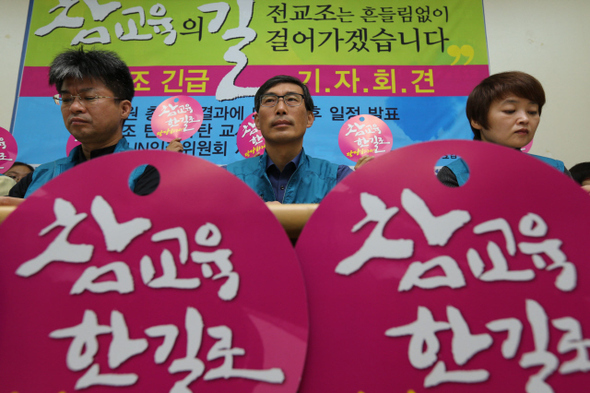 |
KTU Chairman Kim Jeong-hun (center) at a press conference at the union’s headquarters in Seoul’s Yeongdeungpo district, Oct. 21. Kim announced the KYU’s plan to fight against government efforts to revoke its official union status. (by Ryu Woo-jong, staff photographer)
|
Government is set to revoke official status of union because it has several members who aren’t currently employed
By Lee Jung-gook, staff reporter
The Korea Teachers and Education Workers’ Union (KTU), which is currently on the verge of losing its official union status, has decided to take its case to the United Nations Human Rights Council (UNHRC) if the South Korean government does revoke its status.
The teachers’ union has already filed a suit against the South Korean government with the International Labour Organization (ILO). The government is planning to notify the union that it is no longer an officially recognized labor union as early as Oct. 24.
The KTU held an emergency press conference at its headquarters in Seoul’s Yeongdeungpo district on the morning of Oct. 21. There the union announced that it plans to dedicate all of its energy to fighting the government’s attempt to revoke its status.
After making public a declaration signed by about 36,000 teachers, the KTU decided to release a citizens’ manifesto by Oct. 23 that would be signed by instructors, parents of students, and professors.
The teachers’ declaration was issued under the title, “Stop Oppressing the KTU.”
“The government should abolish the wicked labor laws that violate the South Korean constitution and are not in keeping with international standards,” the declaration said. “It must immediately stop making threats to annul the establishment of the union.”
“Not only KTU members but also people who are not members participated in this statement, making it the largest-ever teachers’ statement,” said KTU spokesperson Ha Byung-su.
The union also vowed to let the ILO, the UN, and other international organizations know about the injustice of the South Korean government’s decision.
Along with Education International (EI), a global federation of teachers’ labor unions, the KTU officially lodged a protest with the ILO’s Freedom of Association and Protection of the Right to Organise Convention.
“Even though the ILO has given recommendations to the South Korean government on several occasions, the teachers‘ union is currently in danger of having its status revoked,” the protest said.
If the ILO accepts the petition, it will first uncover the truth of the situation through procedures including so-called “urgent intervention” and then issue a recommendation, following the approval of the convention.
The KTU believes that the ILO will play an important role in alerting the international community to the fact that South Korea is a country that oppresses labor.
The union decided to present the petition to the UN Human Rights Council, which involves a more complicated process, in conjunction with the Korean Confederation of Trade Unions (KCTU) and the Korean Government Employees’ Union (KGEU). It will submit the petition before the end of October.
“In addition to joining with politicians and civil society to carry on a dedicated struggle, we will also appeal to the international community to demonstrate the legitimacy of our union,” said KTU Chairman Kim Jeong-hun. “We will firmly resist any efforts by the government to abolish collective bargaining rights or to force labor union officials to return to work.”
Despite the backlash from the teachers’ union, the Ministry of Employment and Labor still plans to notify the union that it has been decertified.
“We gave the union a deadline of Oct. 23,” said a ministry official who spoke on condition of anonymity. “There have been no changes to our plan to notify the union that its status has revoked, if no corrections are made by that time. We will determine the timing of the notification after Oct. 24.”
copy from :::http://english.hani.co.kr
@@@@@@@@@@@@@@@@@@@@@@@@@@@@@@@@@@@@@@@@
''''''Message to TAN SRI SYED MOKHTAR AL BUKHARY - Press Release ::: Press Report for DRB

No comments:
Post a Comment